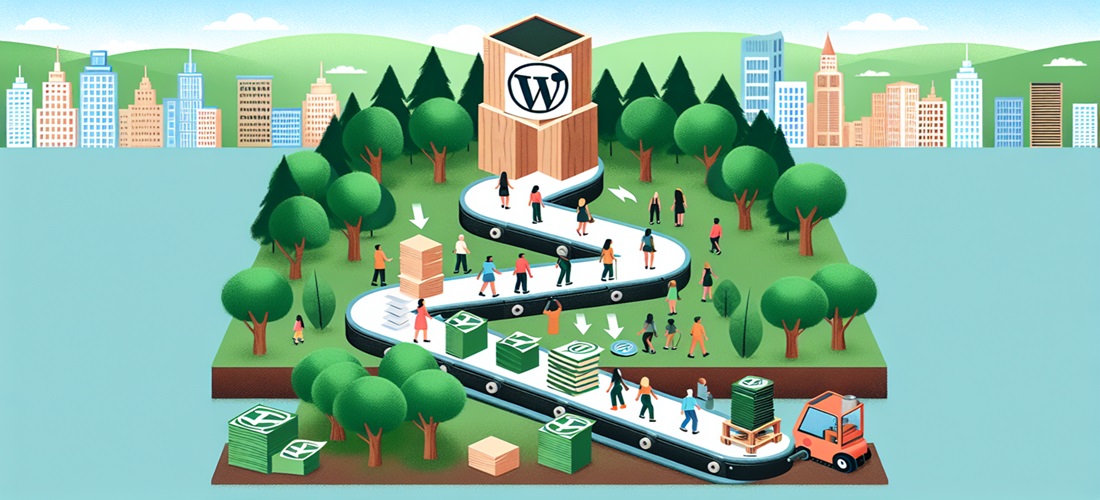How to Move Your Blog from Blogger to WordPress Easily and Successfully
How to Move Your Blog From Blogger to WordPress
You had a great idea for a blog; maybe it was related to your work or business or maybe you just spotted a niche in the market for a topic that really interested you. Regardless of the reasons for starting it, you put together some initial content, sourced some images (maybe even videos), and launched your blog on Blogger as it was a completely free platform.
Fast forward a year or so. You’ve managed to garner a decent level of regular readers, and maybe it is even growing at a decent rate with each blog you publish. Your blog has even managed to grab the attention of different businesses who have paid you to include backlinks to their site or even to write guest blogs on specialist subjects such as mainframe application modernization if that’s your field.
Yet despite a moderate amount of success, you feel there’s something missing, you could be bigger than you are. Then you realize that the platform may be holding you back. While a great free resource for entry-level bloggers, there comes a time – if your blog is growing – when you need to look elsewhere to get the features and functionality you want to take your blog into the big leagues,
The answer is obvious; WordPress. You worry though; can you migrate your blog to WordPress without losing any of your historical content? How easy – or hard – is it to move your blog from Blogger to WordPress?
Why move from Blogger to WordPress?
Blogger is entirely free and is ideal for bloggers who want to ‘dip their toes in the water and see how their blog content is received. It’s simple to use and can be perfect for beginners but the themes tend to be very similar. All you need to start is a Google account and you can have your content live in a matter of minutes using the blogspot.com sub-domain.
However, Blogger’s simplicity is also its biggest drawback. You are very limited when it comes to themes and plugins and Blogger is the ultimate owner of your blog, unlike WordPress where you own your blog. If you are serious about your blogging efforts and want a commercial aspect to it where you can successfully monetize it, then you need to make the move to WordPress. While you do have to pay for hosting, it can be as little as $10 per month.
Impact on SEO and rankings
One big worry many bloggers have when it comes to moving from Blogger to WordPress is how it will affect rankings and SEOs. But it won’t have a negative effect if done properly. In fact, you should see improved rankings if you tread carefully. As with other aspects of your site, WordPress offers multiple plugins that can improve your SEO. And if your permalinks and redirections are done correctly, you should see no drop in rankings and will eventually begin to improve.
How to Move Your Blog from Blogger to WordPress?
Many people worry that the migration process will be complicated and that they will lose historical content. In fact, the process is very simple if you follow the steps in our guide.
1. Obtain a domain name and hosting plan
Before you migrate to WordPress, you will need to have a domain name and a web hosting plan. Your domain name should reflect what you are blogging about in most cases and should cost around $15. For example, perhaps you are writing about IVR system technology so a good domain name (if available) would be IVR.com. Hosting can cost around $7.99 per month but look for the many special offers available.
2. Update domain name
You only need to do this step if you are using a custom domain name on Blogger. Your new web hosting company will provide you with new URLs. The process of changing can differ from one provider to the other, such as country-specific Aussie domain names, so look for details from your current domain provider if you need to do this.
3. Install WordPress
This is an easy step and there are multiple guides on how to install WordPress if you are a novice. Simply download the zipped package, unzip it, and then install it. By following the instructions, you will soon have WordPress fully installed.
4. Export your existing blog from Blogger
Now comes the important part. You want to be able to export your existing and historical blog content from Blogger to your new WordPress account. After all, some of your old blog content could still be relevant and can help you in any monetization efforts.
For example, say you wrote a great blog piece on small business VoIP; that may be seen on your new WordPress blog and attract commercial interest.
The first thing to do is to go to your Blogger profile and dashboard. In the settings section, go to ‘other‘ and then click the ‘back up content’ option. You should then see a popup box that asks whether you want to make a backup of your blog. Choose the save to your computer option. You now have a file on your computer with all your blog content in it.
5. Import your blog to WordPress
Now the next part; moving that saved content to your new WordPress site. You have two choices here; you can do it manually or, if you do not feel technically confident enough to do this, you can use any one of a number of available plugins.
With a plugin, all you need to do is choose the ‘run importer‘ option and it does everything for you. However, note that many plugins place restrictions on how many blog posts you can import.
If you decide to go the manual route, then you need to first go to your new WordPress site dashboard. On the dashboard, you will see a ‘Tools‘ option. Choose that and then the ‘import‘ button. You will then see a ‘blogger‘ option and, below that, first click install now and then ‘run importer‘. Then use ‘choose file‘ to select the file you created during Step 4.
Once you have successfully imported the files, you will be asked if you want to create new users or you can assign posts to users you have already created (this is useful if you host guest blogs or have several writers involved).
6. Images
Of course, your blogs will most likely have multiple images attached and you want to import them too. Images are not imported when you port over your blog content so you need to do this separately. but as with all things WordPress, it can be easily done via the plugin. There is one quite simple called Auto Upload Images.
Once you have installed that plugin, it automatically detects all images in your blog posts and any other pages. It then saves any images to your WordPress media library and automatically updates all image URLs. If you want, you can also make adjustments such as customizing image URLs, giving images new names, as well as adjusting factors such as width and height.
7. Permalinks
You want every individual page of your new WordPress blog to have a permalink that is of identical structure to your old Blogger links so that people are redirected to your new site.
You can choose your preferred permalink structure via your WordPress dashboard. Go to settings, choose ‘permalinks‘, then in the ‘custom structure‘ section, you can specify your ideal URL structure.
8. Redirecting
So, you now have all your imported blogs and images as well as your permalinks. Now you want to be sure that when someone clicks on an old Blogger post, they are redirected to your new WordPress site. Once again, this is where a specialized WordPress plugin, called ‘Blogger to WordPress can help. Once you install it, select ‘Blogger to WordPress redirection‘ from the tools.
That will take you to the configuration page and simply click the ‘Start configuration‘ button so that the plugin generates a code for Blogger.com. Return to your Blogger settings and click ‘Edit HTML‘. Paste the code you have copied and choose ‘Save theme‘. You now want to disable Blogger’s mobile version so click ‘back‘ on edit HTML and select ‘no‘ when it asks if you want a mobile version.
The takeaway
Those are the main steps to moving your blog from Blogger to WordPress. Once you are live, you will quickly see why so many sites choose to use WordPress. As well as a wealth of plugins, there are customizable themes and other factors that Blogger simply didn’t offer. And, just as you might use a software proposal template in business, you will find WordPress offers templates to suit almost any need.
If you are serious about blogging, you will find that moving from Blogger to WordPress not only opens new doors and opportunities, it also gives you the ability to far extend your reach. Greater reach means that you can attract more readers and subscribers and that the chances for monetization also increase greatly. And if you’re not tech savvy, building that great site can be as easy as moving from Blogger thanks to the many useful plugins and guides.
| Still can’t do it on your own? | |
|---|---|
| Don’t worry hire us we will migrate your blog on Blogger to WordPress for you. | Mail Us |





Wow that was odd. I just wrote an extremely long comment but after I clicked submit my comment didn’t
appear. Grrrr… well I’m not writing all that over again. Regardless, just wanted to
say superb blog!